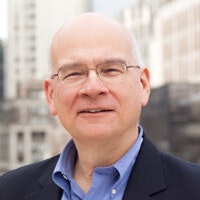God is the only person from whom you can hide nothing… Prayer therefore leads to a self-knowledge that is impossible to achieve any other way.
Timothy Keller

Prayer Therefore Leads
Topic: Prayer, Meditation, & Contemplation
Prayer is not simply the solitary exploration of your own subjectivity. You are with another, and that Other is unique. God is the only person from whom you can hide nothing. Before Him you come to see yourself in a new, unique light. This is the most intense possible relationship between persons. Prayer therefore leads to a self-knowledge that is impossible to achieve any other way.
Timothy J. Keller (1950 - 2023) was the founding pastor of Redeemer Presbyterian Church in Manhattan, a role he embraced in 1989 alongside his wife, Kathy, and their three young sons. Over the span of 28 years, Keller nurtured a diverse congregation of young professionals, witnessing its remarkable growth to a weekly attendance surpassing 5,000 individuals. His visionary leadership and profound understanding of the urban context made Redeemer a beacon of hope and spiritual renewal in the heart of New York City.
In addition to his pastoral responsibilities, Keller co-founded Redeemer City to City (CTC), where he served as Chairman. Through this initiative, he spearheaded the establishment of new churches in global cities, including New York. CTC not only focused on physical church planting but also published resources and books to equip ministry practitioners in urban environments. Keller's literary contributions, such as the bestselling books The Reason for God and The Prodigal God, gained international acclaim, selling millions of copies and being translated into multiple languages.
Keller's profound impact on the future of Christianity was widely recognized. Christianity Today aptly described him as a pioneer of the new urban Christians, envisioning a future where evangelical Christians would be known for their love of cities, commitment to mercy and justice, and deep love for their neighbors. Hailing from Pennsylvania, Keller pursued his education at Bucknell University, Gordon-Conwell Theological Seminary, and Westminster Theological Seminary. Before founding Redeemer Presbyterian Church, he served as a pastor at West Hopewell Presbyterian Church in Virginia, an associate professor of Practical Theology at Westminster Theological Seminary, and the Director of Mercy Ministries for the Presbyterian Church in America. Through his multifaceted journey, Keller embodied a faith that sought to transform individuals, communities, and cities alike.
Experiencing awe and intimacy with God
Keller, Timothy. “Experiencing Awe and Intimacy with God.” The Washington Times, [The Washington Times, 30 Dec. 2015, www.washingtontimes.com/news/2015/dec/30/power-of-prayer-experiencing-awe-and-intimacy-with/].

Timothy Keller
Theme: Prayer

Timothy J. Keller Writes About Flannery O’Connor’s Prayer Journal
Additional Timothy Keller Quotes
Resources
Related Quotes
Copyright © 2017 – 2025 LuminaryQuotes.com About Us